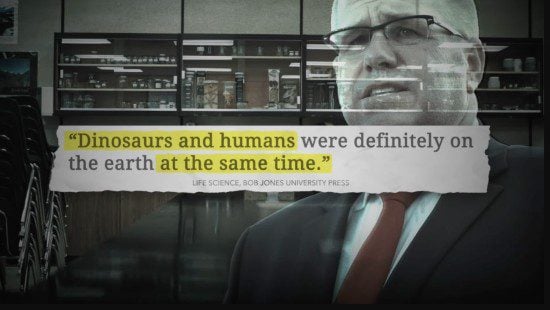BioLogos has listed what it calls “Core Tenets or Assumptions of Theistic Evolution.” I mostly agree with them, but I am not a theistic evolutionist and I do not “believe in” evolution.
Well, actually, let me qualify that a bit: I do not accept the label of “theistic evolutionist.” I cannot really say, with certainty, that I am not one because I cannot be certain what that phrase means. I understand each of those words, separately, but squish them together like that and I can’t make sense of what it is that is being said.
From just a cursory glance, it might seem that this label describes me perfectly. Here are two true statements about me:
1. I believe in God.
2. I acknowledge and affirm the reality of evolution.
If that is all this label meant — if a “theistic evolutionist” is defined as “a person for whom both of those things are true” — then it would certainly seem to apply to me.
 But that cannot be what this phrase means. Both of these words mean things, and neither one can mean that.
But that cannot be what this phrase means. Both of these words mean things, and neither one can mean that.
Let’s start with the latter: I am not an evolutionist.
I am not a scientist and it would be inappropriate for me to appropriate for myself a label that designates me as one. I acknowledge and affirm the reality of science, but that does not make me a “scientist.” I acknowledge and affirm the reality of quantum physics, but that does not make me a quantum physicist. Nor am I a chemist or a virologist, even though I acknowledge and affirm the truth of both of those disciplines.
So why, then, should my identical layperson’s appreciation and acknowledgement of evolution make me an “evolutionist”?
It shouldn’t. It doesn’t.
The idea that it does is based on the premise that evolution is a special case. But evolution is not a special case.
We’re asked to treat it as special by the pretense of classifying anyone who “believes” in evolution as an “evolutionist.” There are two things askew there. First, again, we don’t speak this way when discussing any other process or phenomena. We don’t pretend that anyone who believes in chemistry is a chemist or that anyone who believes in astrophysics is an astrophysicist.
And, secondly, we do not speak of people “believing” in chemistry or astrophysics. That word — “believe” — gets applied to evolution because, again, we’re pretending that evolution is a special case.
And, again, evolution is not a special case.
We do not say that someone “believes in” photosynthesis, or in the magnetosphere, or in entropy or gravity or cell division or condensation. We do not say that because it would sound strange and because it would be misleading, suggesting that somehow the reality of photosynthesis was contingent on our acceptance or rejection of it, or that photosynthesis is somehow true for some people but not for others. We do not speak of “believing in” photosynthesis because belief is beside the point. Photosynthesis is an actual, observable, measurable process that we can and have actually observed and measured.
And so is evolution. Evolution is not a special case.
So I do not “believe in” evolution, I simply acknowledge and affirm its actuality.
Now let’s look at that other word, “theistic.”
I believe that God exists. “Believe” is an appropriate word in this context because whether or not God is actually actual is not something that can be directly observed and measured. It’s possible that God exists. It’s possible that God does not exist. I believe that God does, actually, exist. I believe this with utter certitude, but I cannot claim to have certainty.
My belief in the existence of God makes me a theist. This noun, “theist,” means exactly this: a person who believes in the existence of a God or Gods. “Fred is a theist” is, therefore, a correct statement. I generally prefer a more specific statement, such as “Fred is a Christian,” which conveys a bit more about the identity and character of the God I believe exists. But while it’s less specific than I’d like, “Fred is a theist” is accurate and correct.
We can also say, accurately, that “Fred’s religion is theistic.” Or we can say, somewhat awkwardly, but technically accurately, that “Fred is theistic.” That’s awkward because it’s not quite how we usually apply that adjective, about which more later.
Given that — given that I am, explicitly, a theist — can we at least concede that the first part of the label “theistic evolutionist” might be appropriate to apply to me?
I don’t think so, because in that label the word “theistic” is not being applied to the person, but to evolution itself. A “theistic evolutionist” is not a theist who “believes in” evolution, but rather a person who “believes in” theistic evolution. The adjective does not apply to the person — to the believer in God and in evolution — but to the natural phenomenon itself.
Or, rather, not to evolution itself, but to some qualified form of it. Not evolution, but “theistic evolution.”
And, again, I don’t know what that means.
We might guess that “theistic evolution” refers to the perspective of Christians and many other theists that God is ever-present and that nothing is separate from God’s over-arching providence — that by God “all things consist,” as the Apostle Paul wrote. Perhaps this is all this adjective signifies here.
But I’m afraid that won’t do. If the word is simply meant to express something that all Christians believe to be true of every process and phenomenon, then we must somehow account for the fact that we do not use it in reference to any other such process or phenomenon.
We may believe that there is a certain providence in the fall of a sparrow, but we do not speak of theistic sparrows. Nor do we speak of theistic photosynthesis, theistic fusion, theistic chemistry or theistic algebra. We believe that God cares for the lilies of the field, but we never therefore refer to them as theistic lilies or speak of theistic botany.
Sir Isaac Newton earnestly believed in God’s active, pervasive providence, but he never saw fit to christen his theory as “theistic gravity.”
The exceptional use of this term — the application of this adjective to this particular noun but not to any of the myriad other similar nouns — suggests again that we must treat evolution as some kind of special case.
But evolution is not a special case.
This is getting long, so let’s pick this up in part 2, to discuss some other possible things that “theistic evolution” might mean, and why it cannot (or should not) mean them either.












